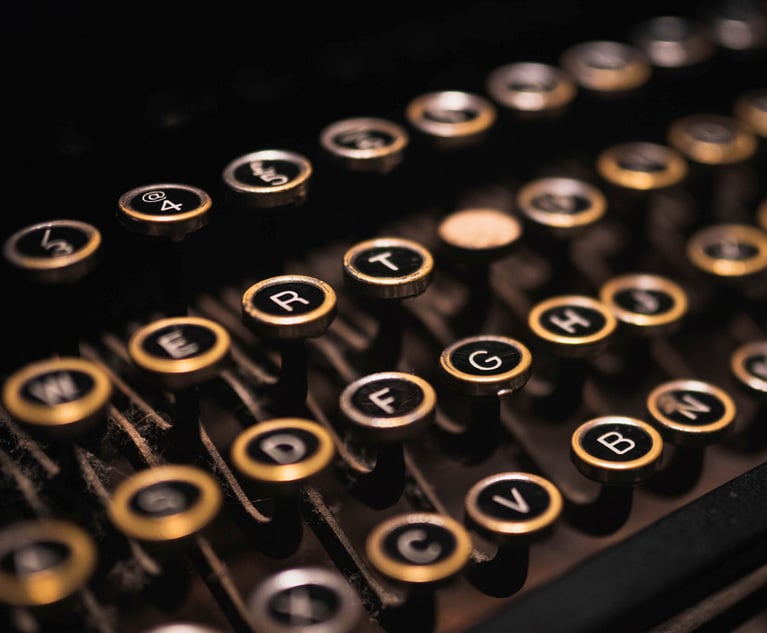In defence of the NDA
We must not allow high profile cases like Weinstein and Green to create an atmosphere in which the existence of an NDA implies evidence of guilt
February 15, 2019 at 04:56 AM
6 minute read
It's the legal instrument the public loves to hate. Non-disclosure agreements (NDAs), or 'gagging orders' as the press loves to call them, are back in the spotlight after a series of high-profile scandals.
It was the #MeToo movement that did it. Revelations about Harvey Weinstein entering into confidential financial settlements to cover up alleged sexual harassment brought the issue to the forefront of media – and regulatory – attention.
This week's news has seen further failures and successes in this delicate sphere. Sir Philip Green dropped his thwarted legal claim against the Telegraph. And City giant Linklaters successfully extended its injunction against former director Frank Mellish, preventing him from disclosing what he has called "the ongoing struggle Linklaters has with women" in the workplace.
Our media are of course perfectly outraged at the "legal weapon of choice for the rich and powerful", allowing influential men to cover up sexual abuse and their other systematic failures in the workplace.
Lord Hain, potentially in contempt of parliament and contempt of court when he named Philip Green in the House of Lords, nevertheless identified the risk of "serious abuse of non-disclosure agreement law", and went on to advocate reform: "Victims of abuse can no longer be silenced."
So what are NDAs? What can they be used to protect? And by whom are they being misused?
A non-disclosure agreement is no more than a legal contract, specifically used to protect confidential information known to the parties. They are very common between employers and employees, and represent a commitment to keep certain information confidential, often including the facts of a given employment dispute, the terms of settlement and any sums paid under the agreement. If the NDA is breached by a party, the other party can claim damages for breach of contract.
NDAs have long been used to protect valuable trade secrets from business deals to recipes, and chemical formulae to trading algorithms. As the Government Equalities Office says: "NDAs can form a legitimate part of an employment contract and are important to protect trade secrets that could otherwise undermine a company's competitiveness in the marketplace."
So far, so vanilla.
NDAs are also used to protect settlement of matters that might otherwise proceed to litigation, where parties want the very existence of the dispute – and any settlement – to remain confidential. By their very nature, the existence and terms of these agreements are also confidential, so aside from the parties and their lawyers, nobody knows how many of these agreements exist or what they protect.
Suddenly, ripe for speculation!
In reality, particularly in the employment sphere, confidential settlement agreements merely provide a practical way to resolve workplace disputes or end a working relationship without the need to go through the cost, publicity and stress (for both parties) of an employment tribunal or trial.
In instances involving sexual harassment in the workplace, NDAs enable victims to get a settlement from their employer; in many cases no settlement would be agreed without an NDA. This is why the House of Commons' Women and Equalities Committee warns: "There may be times when a victim makes the judgement that signing an NDA is genuinely in their own best interests, perhaps because it provides a route to resolution that they feel would entail less trauma than going to court or because they value the guarantee of privacy."
As the Court of Appeal in the Green case explained, provided that the agreement is freely entered into, without improper pressure or any other vitiating factor, with the benefit of independent legal advice, and with allowance for disclosure of any wrongdoing to the police or appropriate regulatory or statutory body, the public policy reasons in favour of upholding the agreement may well outweigh the Article 10 rights of the party who wishes to publish the confidential information. The Court, in examining the facts not available to the press or the public, found that each of the agreements in question satisfied these conditions.
We must not allow high-profile cases like Weinstein and Green to create an atmosphere in which the existence of an NDA implies evidence of guilt. The press and the public perhaps do not appreciate that often, complainants may very willingly agree to or seek out confidentiality provisions to resolve disputes privately and, sometimes, because those provisions may result in a higher settlement payment.
That's not to say NDAs are never abused. They can be used unethically and potentially unlawfully. But even then, the villain need not be the paying party. We see cases where claimants seek large payments from prominent people, often threatening to publicise baseless allegations through civil litigation or the media.
These people abuse the system, using the threat of irreparable reputational damage to extract large settlement payments from wealthy people. They take advantage of the fact that most would rather pay than risk negative publicity, and potentially untold damage to their family and business interests. Vulnerable doesn't have to mean powerless; the powerful can be vulnerable too.
Now lawyers are under scrutiny as well. The Solicitors Regulation Authority (SRA) and Bar Council have issued guidance on NDA use. The Telegraph even claims that lawyers involved in the Philip Green NDAs will be investigated by the SRA.
Meanwhile, a parliamentary inquiry has recommended that the use of NDAs in sexual harassment cases should be more tightly controlled, and a further inquiry is underway to review the wider use of NDAs where any form of harassment or discrimination is alleged. Greater regulation is surely to be welcomed, but let's not get swept away by a self-interested media panic.
This content has been archived. It is available through our partners, LexisNexis® and Bloomberg Law.
To view this content, please continue to their sites.
Not a Lexis Subscriber?
Subscribe Now
Not a Bloomberg Law Subscriber?
Subscribe Now
NOT FOR REPRINT
© 2025 ALM Global, LLC, All Rights Reserved. Request academic re-use from www.copyright.com. All other uses, submit a request to [email protected]. For more information visit Asset & Logo Licensing.
You Might Like
View All

Big Law Walks a Tightrope But Herbert Smith Freehills Refuses to Lose Its Footing
8 minute read
Luxembourg Hot, Beijing Not: In Today’s Cutthroat Market, Regions Need a Business Case
4 minute readTrending Stories
Who Got The Work
Michael G. Bongiorno, Andrew Scott Dulberg and Elizabeth E. Driscoll from Wilmer Cutler Pickering Hale and Dorr have stepped in to represent Symbotic Inc., an A.I.-enabled technology platform that focuses on increasing supply chain efficiency, and other defendants in a pending shareholder derivative lawsuit. The case, filed Oct. 2 in Massachusetts District Court by the Brown Law Firm on behalf of Stephen Austen, accuses certain officers and directors of misleading investors in regard to Symbotic's potential for margin growth by failing to disclose that the company was not equipped to timely deploy its systems or manage expenses through project delays. The case, assigned to U.S. District Judge Nathaniel M. Gorton, is 1:24-cv-12522, Austen v. Cohen et al.
Who Got The Work
Edmund Polubinski and Marie Killmond of Davis Polk & Wardwell have entered appearances for data platform software development company MongoDB and other defendants in a pending shareholder derivative lawsuit. The action, filed Oct. 7 in New York Southern District Court by the Brown Law Firm, accuses the company's directors and/or officers of falsely expressing confidence in the company’s restructuring of its sales incentive plan and downplaying the severity of decreases in its upfront commitments. The case is 1:24-cv-07594, Roy v. Ittycheria et al.
Who Got The Work
Amy O. Bruchs and Kurt F. Ellison of Michael Best & Friedrich have entered appearances for Epic Systems Corp. in a pending employment discrimination lawsuit. The suit was filed Sept. 7 in Wisconsin Western District Court by Levine Eisberner LLC and Siri & Glimstad on behalf of a project manager who claims that he was wrongfully terminated after applying for a religious exemption to the defendant's COVID-19 vaccine mandate. The case, assigned to U.S. Magistrate Judge Anita Marie Boor, is 3:24-cv-00630, Secker, Nathan v. Epic Systems Corporation.
Who Got The Work
David X. Sullivan, Thomas J. Finn and Gregory A. Hall from McCarter & English have entered appearances for Sunrun Installation Services in a pending civil rights lawsuit. The complaint was filed Sept. 4 in Connecticut District Court by attorney Robert M. Berke on behalf of former employee George Edward Steins, who was arrested and charged with employing an unregistered home improvement salesperson. The complaint alleges that had Sunrun informed the Connecticut Department of Consumer Protection that the plaintiff's employment had ended in 2017 and that he no longer held Sunrun's home improvement contractor license, he would not have been hit with charges, which were dismissed in May 2024. The case, assigned to U.S. District Judge Jeffrey A. Meyer, is 3:24-cv-01423, Steins v. Sunrun, Inc. et al.
Who Got The Work
Greenberg Traurig shareholder Joshua L. Raskin has entered an appearance for boohoo.com UK Ltd. in a pending patent infringement lawsuit. The suit, filed Sept. 3 in Texas Eastern District Court by Rozier Hardt McDonough on behalf of Alto Dynamics, asserts five patents related to an online shopping platform. The case, assigned to U.S. District Judge Rodney Gilstrap, is 2:24-cv-00719, Alto Dynamics, LLC v. boohoo.com UK Limited.
Featured Firms
Law Offices of Gary Martin Hays & Associates, P.C.
(470) 294-1674
Law Offices of Mark E. Salomone
(857) 444-6468
Smith & Hassler
(713) 739-1250









